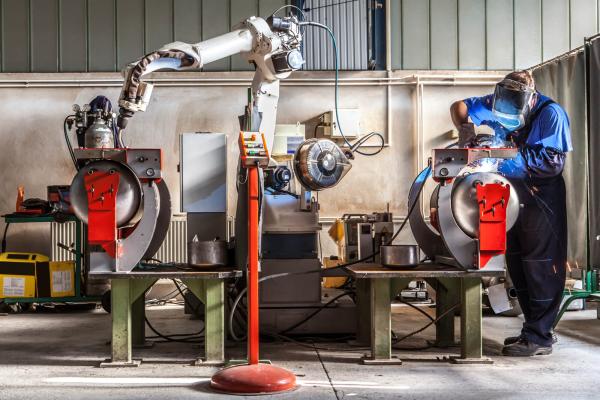THE AGE OF THE ROBOTS is here. If you didn’t notice, it’s because we’re calling them artificial intelligence (AI) and they don’t look like we expected. They’re the touchscreen kiosk that has replaced the cashier at Panera, the mechanical arms and claws flipping burgers at fast food joints, the drone that may someday deliver your Amazon order. They’re the software that can turn a baseball box score or corporate earnings report into a wire service news story.
According to a recent report from the Brookings Institute, about 38 percent of the adult population could be put out of work by smart machines in the next generation. The choices we are making about our AI future depend upon our answer to the question Wendell Berry posed 30 years ago with his book What Are People For? Up to now, at least in the U.S., the answer has been that people exist to generate corporate profits.
Andrew Yang, a Silicon Valley entrepreneur running for the Democratic presidential nomination, argues that Donald Trump is president because automation eliminated 4 million manufacturing jobs in the Rust Belt states Trump narrowly won. Yang expects that blue collar alienation will multiply soon, when driverless vehicles replace 3.5 million truck drivers.
His answer to the jobless AI future is a universal basic income (UBI). He would have the U.S. government issue $1,000 per month to each individual aged 18 to 64. Of course, $1,000 per adult is not enough to support a household: People would still need to work. To Yang, the UBI payment would simply allow low-wage workers to retain a measure of human dignity and maybe stay out of debt, so they can build toward a better life. That’s the Silicon Valley take on the automated future. Science and engineering will continue their single-minded devotion to corporate profit, and those left behind will be paid off with a small bribe.
A far better idea is the federal job guarantee supported by several of the other 2020 presidential candidates. This would do what it says: ensure a job paying at least $15 per hour plus benefits to any American who is willing to work. In immediate terms, this is a better approach because instead of letting low-wage employers off the hook, it will force them to compete with the wages, benefits, and working conditions offered by the guaranteed jobs.
The job guarantee also addresses the fact that there is work that desperately needs to be done for the common good and will never turn a profit for the private sector. For example, we need well-paid and well-trained people raising young children and providing early education, making the conversion to clean energy, laying the cable for universal broadband access, and working on farms to raise the food we need in a sustainable system. And that’s just a start.
A job guarantee also addresses that fundamental question, “What are people for?” In the end, we’re not here just to be entertained on our screens. As St. John Paul II put it in his papal encyclical Laborem Exercens: “Work is a duty, because our Creator demanded it and because it maintains and develops our humanity. We must work out of regard for others, especially our own families, but also because of the society we belong to and in fact because of the whole of humanity.”

Got something to say about what you're reading? We value your feedback!







